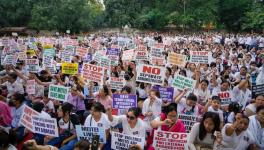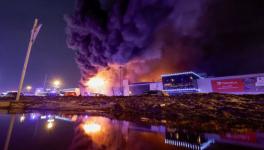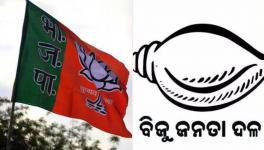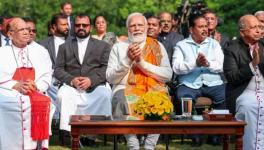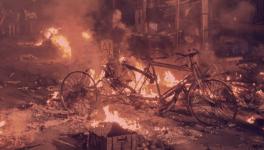In Iraq, Christmas is Becoming Many Muslims' Favorite New Holiday
Christmas revelers on parade in northern Iraq
Iraqi woman Kholoud Khardoum suspects she was the one who introduced Christmas to her village in southern Iraq. It all started six years ago with a small plastic Christmas tree and some gifts for her nieces and nephews during a visit home, the Iraqi journalist, who resides in Baghdad, recounted.
"At first, it was a bit weird. People kept asking what the tree was. It was something they had only seen on TV," she told DW; her hometown is just outside the city of Karbala, a comparatively conservative place with a Shiite Muslim majority that is also a major destination for Muslim pilgrims. "But with the lights and the decorations and gifts, the children really loved it. Then the neighbors came over and they liked what we were doing too."
That was in 2015. Now, she said, those neighbors hold their own Christmas parties and the tree in her family home is usually decorated before she even gets there.
A Christian family prepares for Christmas in Iraq
Countrywide popularity
Khardoum has also noticed that more and more Iraqis, like her family and her neighbors, are celebrating Christmas. "A few years ago you would only see Christmas decorations being sold in shops in places like Karrada or Jadiriyah [neighborhoods in Baghdad that are home to the city's Christian minority]," Khardoum explained. "But now they're all over the city."
Christmas is even becoming more popular in southern Iraq, stronghold of the country's Shiite Muslim majority, she noted. For example, her nephew goes to a private school in Karbala and there the students all pose under a large Christmas tree set up by the teachers, something that wouldn't necessarily have happened a few years ago.
In Baghdad, the city council has placed Christmas trees at intersections and many big hotels and restaurants are decorated accordingly. After visiting markets in the city this month, Iraqi website, Shafaq News, wrote that Christmas is bigger than ever in Iraq. This year, sales of trees and Santa figures are "unprecedented" and the turnout "remarkable," the outlet reported, after speaking with local stallholders.
Annual holiday
All this is despite the fact that Iraq only officially made December 25 a national public holiday last year.
Christmas has been classified as a holiday in Iraq since 2018, but that designation was up for annual renewal. Now it's permanent. This is relatively unusual in the Middle East. While they may celebrate Christmas in some way, only four other nations out of 20 in Iraq's vicinity — Sudan, Syria, Jordan and Lebanon — recognize Christmas officially. All of those countries boast a higher percentage of Christians than Iraq.
Yet, despite the fact that Christmas is growing in popularity, Iraq's Christians remain an endangered minority.
The last Iraqi government census was taken in 1987 and it counted around 1.4 million Christians. But over the last three decades, numbers have plummeted as Christians emigrated due to prejudice and persecution, as well as various political and security crises. Today, there are thought to be between 200,000 and 300,000 Christians left in Iraq, although some have suggested the real figure is even lower.
The extremist Islamic State group destroyed St George's monastery in northern Iraq
Christmas is political
So why all the enthusiasm for Christmas, and why now?
It can be partly explained by consumerism, globalization, social media, as well as how entertainment — things like movies and games — is marketed to all cultures.
It's the same reason Valentine's Day is now an international phenomenon, sociologist Amro Ali, a lecturer in political sociology at the American University in Cairo, told German newspaper the Sueddeutsche Zeitung. It is also a way for young Arabs to connect with what they perceive as a progressive, potentially even romantic, European tradition, Ali suggested.
An anti-government protestor in Baghdad in December 2019
In Iraq, the trend is also political. After the defeat of the extremist group known as the "Islamic State" there in 2017, many Iraqis told local media they were celebrating Christmas to show tolerance and solidarity with those minorities the extremist group had so brutally persecuted.
"Yes, it could be all of those reasons," Bashar Matti Warda, the Chaldean Catholic archbishop of the northern Iraqi city of Erbil, speculated. "But as an Iraqi, I think it might also be about the message behind Christmas, which is one of joy and good news. The Iraqi people have experienced a lot of tough times over the past decades. This is a way not just to celebrate, but to fight hopelessness," Warda suggested.
The archbishop pointed to the way his countrypeople greeted the visit of Pope Francis earlier this year. "We saw so many people participating, not just Christians," he told DW. "It's not just about tolerance, it's all about needing to find joy."
Secular celebrations
Most of the Iraqi Christmas celebrations appear not to be particularly connected to the festival's contemporary religious origins. Its most popular symbol here and elsewhere in the Middle East tends to be a bountifully-decorated Christmas tree, a throwback to winter solstice celebrations.
In the Middle East, the most popular symbol of the season is a Christmas tree
In fact, a lot of Iraqis know it as a "New Year's tree" and don't see much, if any, connection between ringing in the year to come and Christianity. A generous Santa Claus figure, or "Baba Noel," as he is often called in Iraq, is also popular, but he too is associated with the New Year because he brings gifts like new clothes.
Actual religious symbols are not seen as often. Despite the fact that Jesus Christ gets dozens of mentions in Islam's holy book, the Koran — and some Muslims do honor the religious icon because of this — emblems like crosses or nativity scenes are not a common part of Middle Eastern celebrations.
Another holiday tradition
Every year without fail, some Muslim clerics criticize parishioners for celebrating Christmas.
Christmas criticisms run the gamut: from mild-mannered tolerance, where decorations and gift-giving is fine as long as you don't enter into religious rituals, to moderate censure, such as telling tea-totaling Muslims to avoid Christmas parties where alcohol is served or skin is bared; to outright bans on everything Christmassy, because this equals less enthusiasm for official Islamic holidays.
Very conservative preachers have even issued religious edicts, or fatwas, against Christmas.
In a 2018 sermon, a prominent Sunni Muslim cleric in Iraq, Abdul-Mahdi al-Sumaidaie, told followers that celebrating Christmas meant they were neglecting Islam. His statements caused outrage, with many ordinary Iraqis — as well as Christian and Muslim authorities — refuting the idea and stressing how long Christianity had been part of Iraq's social fabric.
Thousands of Iraqis of all denominations turned out to see the Catholic Pope in Iraq this year
More tolerance
Baghdad-based journalist Khardoum says that religious conservatives always complain about these kinds of things and that every family in Iraq celebrates differently. This ranges from gathering around the "New Year's tree" to her own family's new tradition, where her nieces and nephews enjoy the toys and new clothes but her pious mother actually commemorates the birth of Isa, as Jesus is known in the Koran.
"Look, I am an observant Muslim," she told DW. "In this case, I really don't think it matters if you are Muslim or Christian. What matters is that we all believe in God. For me, that's the important thing."
Archbishop Warda thinks Iraqis' increasing enthusiasm for Christmas could also be positive in another way, in that it potentially brings the Christian minority more recognition from the Muslim majority.
"I hope it shows Iraqi society that their minorities have something special to offer: the joy, the colors, the lights, the songs," he enthused. "And that, at the end of the day, everybody will say, 'you are an important part of Iraqi society, please stay'."
-

SAINT NICHOLAS — ONE MAN, ONE MISSION
Out and about with staff and miter
Saint Nicholas was a 4th-century bishop who lived in Myra, a town in what is today Turkey. According to legend, this son of rich parents gave his entire wealth to the poor. This made him the forerunner of Father Christmas or Santa Claus and Germany's Christ Child, as well as becoming a symbol of the Christmas season.
YOU MIGHT ALSO LIKE
Get the latest reports & analysis with people's perspective on Protests, movements & deep analytical videos, discussions of the current affairs in your Telegram app. Subscribe to NewsClick's Telegram channel & get Real-Time updates on stories, as they get published on our website.















